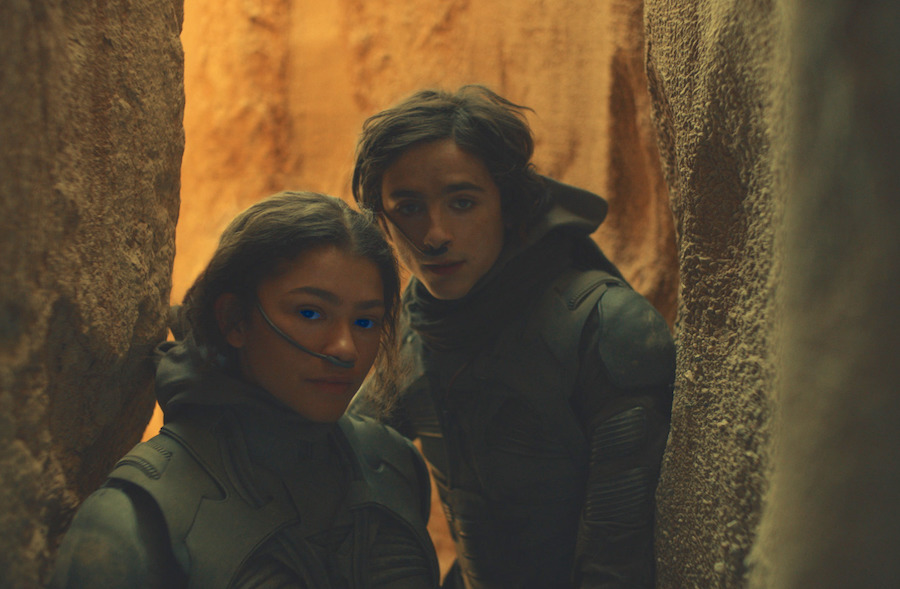by Elisa Giudici

Dreams are messages from the deep. This line from Denis Villeneuve's adaptation of Frank Herbert's SF novel perfectly describes the seductive dangerous power of dream we've cherished for a very long time begin to come true. Villeneuve is one of many directors of a generation that grew up reading Frank Herbert visionary sci-fi novels about messianic leadership and predestination, colonization and contamination of an alien world and culture, and the dangers of mixing politics and religion (to name only a few of the main themes of the Dune novels).
He was well aware of how insidious it can be to work on something that's long been on the back of your mind and your abmition for decades. "I talked for hours with Hans Zimmer about the possibility (a long time dream for both of us), trying to understand if it wasn't advisable to let our dream remain in our heads"...
Well, that's the answer we tried to answer today. Was Denis Villeneuve able to succeed where both David Lynch and Alejandro Jodorowsky had failed? The answer is not simple to give for a movie you must see on the screen and wait for box office results to understand if it will ever be completed. What I know for sure is this: Dune is a dangerous gamble made by a director so sure of his vision and so demanding with both its producers and its audience that it actually reminded me of the cinema of Fellini and Visconti. Sumptuous arthouse productions with very ambitious goals bearing little or no attention to the marketability of the project. Dune is not an arthouse movie, yet it is pure storytelling and vision: no fanservice, no franchise or universe building more than is necessary for the story, a complex approach to the subject that explains everything while demanding the full attention of the viewership and not underestimating its intelligence.

The most radical (and impressive) choice made by Villeneuve here is to aim for the richest, most complex, and layered adaptation of the source. The title sequence tells us this is Dune - Part One. It is a monumental introduction, a preface to a magnificent story yet to be seen. Without a sequel, this Dune is an unfulfilled promise. It is a beautiful chrysalis: only time will tell if it will be just an intermediate stage to a complete artwork or a deadly fall for a franchise unable to spread its wings. Using the movie as a metaphor for the whole project, part one promises us the making of the body and the mind of a Messianic leader who just had time to open his eyes and see a glimpse of the future.
In the recent past, Villeneuve had to face a crucial moment for his future as a director of Dune (and for his entire career), envisioning as his Paul Atreides different versions of the things to come. One of two parallel roads could be taken: a self-contained, very long yet autonomous movie that would cover all of the first Dune book or the richest, longest, more detailed but riskier trilogy. Or maybe there was not a choice at all in the era of series (and "movie serialization"), the golden age of franchise and cross-mediality.
As an avid reader of Frank Herbert who was ready to nitpick every detail (I reread the book just before leaving for Venice), I am in love with this adaptation, even if I still dream of Jodorowsky's more colorful and hallucinatory plans. It is far from the '70 vibes and baroque aesthetics Herbert's Arrakis had, but Villeneuve is able to make Arrakis his world, with subtle color, sleek designs, and beautiful landscapes and costumes, helped by the state of the art technology and artisanship in every single department. It is not groundbreaking sci-fi world-building, but the set decorations, ship designs, and wardrobe choices have refined the current space opera aesthetic to its essential, purest form. One of the few misfires of Dune (for me) was how much it still borrows from familiar approaches to futuristic elements. I was hoping for an innovation to free us from the monopoly of Blade Runner in shaping futuristic aesthetics in cinema. Not this time, but I am still in awe for the most part and particularly of the costume designs: the Bene Gesserit black uniform is so rich in details, stunning and severe).

Dune (2021) is a fascinating movie, with an old approach to the audience and the genre: it is more mythological than today's franchises, with the breadth of an epic and the distant sound of greek oracles and tragedies. Yet it manages to be a blockbuster movie, too, with a solid and glamourous cast, able to create a hype level no one else can aspire to this year. I am not promising you a masterpiece, or an easy watching experience, but Dune is a truly cinematic experience that you absolutely should not miss.
More Venice coverage
- Elisa's Diary #1 Parallel Mothers and Power of the Dog
- Elisa's Diary #2 The Card Counter, Hand of God, The Lost Daughter
- Elisa's Diary #3 Spencer, A Plein Temps, Il Buco
- Eiisa's Diary #4 Sundown, Official Competition, etc...
- Elisa's Diary #5 L'Evenement, Lost Illusions, Mona Lisa...
- Elisa's Diary #6 Reflection, Captain Volkonoff Escaped, Old Henry, etc...
- Nathaniel in Venice #1 Parallel Mothers
- Nathaniel in Venice #2 Power of the Dog, Madeleine Collins
- Nathaniel in Venice #3 Atlantide, Les Promesses, The Lost Daughter
- Nathaniel in Venice #4 107 Mothers, Official Competition, Miracle, etc...
- Nathaniel in Venice #5 Last Night in Soho, Mona Lisa and the Blood Moon
- Nathaneil in Venice #6 Catholic School, A Hole in the Fence, La Caja